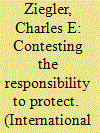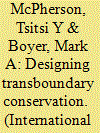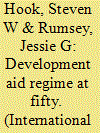|
|
|
Sort Order |
|
|
|
Items / Page
|
|
|
|
|
|
|
| Srl | Item |
| 1 |
ID:
145105


|
|
|
|
|
| Summary/Abstract |
The 70th anniversary of the signing and entry into force of the UN Charter provided an occasion to explore the historical underpinnings of contemporary global governance. This article redresses the neglect of the United Nations as a multilateral structure before the conference that drafted the Charter in 1945. It rehabilitates an underappreciated aspect of the period that began on January 1, 1942, with the “Declaration by United Nations,” namely, the combination of multilateral strategies for military and human security to achieve victory in war and peace. The wide substantive and geographic resonance suggests the extent to which the pressures of the second war to end all wars helped states to overcome their disinclination to collaborate. Today’s fashionable calls for “good enough” global governance abandon the strategy of constructing robust intergovernmental organizations; they are not good enough, especially, because our forebears did much better. Many insights and operational approaches from 1942 to 1945 remain valid for addressing twenty-first-century global challenges.
|
|
|
|
|
|
|
|
|
|
|
|
|
|
|
|
| 2 |
ID:
145109


|
|
|
|
|
| Summary/Abstract |
This article explores the responsibility to protect (R2P) as a contested norm through a detailed study of the position of one major power—Russia—and brief consideration of those of the remaining BRICS. Although Russia's position on R2P has been toward the extreme end of the oppositional spectrum, Russia's concerns about the implementation of R2P are reflected in statements advanced by other BRICS members. Non-Western perspectives on the R2P are explored through the evolution of Russian foreign policy responses to R2P over three periods: from NATO's bombing of Yugoslavia to the UN Summit in 2005; from 2005 to 2011, when Moscow misapplied the R2P norm in the Russo-Georgian war; and the debates in 2011–2013 over R2P in the Libyan and Syrian cases. International pressure has been sufficiently strong to induce formal adherence to the norm of protecting vulnerable populations, though sovereignty issues and concerns about the implementation of R2P make internalization of the norm among non-Western states problematic in the near future.
|
|
|
|
|
|
|
|
|
|
|
|
|
|
|
|
| 3 |
ID:
145106


|
|
|
|
|
| Summary/Abstract |
The aim of biodiversity conservation is the protection of flora and fauna. Within the borders of a given state, such protection is usually facilitated by national laws. In the last 50 years, international legal instruments have sought to recognize transboundary ecological degradation. Solutions need to address the globalization of ecological damage through a paradigm shift in the conceptualization of state sovereignty and biodiversity. The boundary conflicts between Venezuela/Guyana and Guyana/Suriname are examined here for a conceptualized transboundary conservation initiative termed the Guiana Shield Ecoregion Reserve (GSER). Public goods theory is applied to facilitate greater understanding of the value of ecosystem services, carbon sequestration, and similar outputs from ecosystems. The proposal for a GSER might serve as a model for other transboundary conflicts where biodiversity conservation and its implicit provisioning of public goods might be a uniting paradigm for action.
|
|
|
|
|
|
|
|
|
|
|
|
|
|
|
|
| 4 |
ID:
145108


|
|
|
|
|
| Summary/Abstract |
The paper considers the status of the global development aid regime, which originated in 1960 and remains the primary conduit for the delivery of Official Development Assistance (ODA) to impoverished states. We begin by situating the inquiry in regime analysis, which emerged in the 1970s to explain patterns of interstate cooperation that were not captured by existing paradigms of world politics. We then suggest a means by which the cohesion of a given transnational regime may be tested over time. Specifically, we trace the ODA regime's adherence to its own procedural standards between 1961 and 2011 and find that, while the ODA regime has consistently failed to reach its quantitative targets, it has surpassed its qualitative targets, such as the ratio of grants to loans, since the 1990s. Finally, we examine aid transfers from non-DAC sources and consider to what extent this activity can be reconciled with the ODA regime's practices in their current form. We also question whether the challenges posed by non-DAC donors reflect regime erosion and, if so, whether this can be attributed to the decline of its leading member (the United States), as theories of hegemonic stability expect.
|
|
|
|
|
|
|
|
|
|
|
|
|
|
|
|
| 5 |
ID:
145107


|
|
|
|
|
| Summary/Abstract |
Human trafficking has been the subject of growing attention from both scholars and policymakers. The internationally accepted definition of human trafficking used by governments and international organizations identifies three purposes of trading in persons: sexual exploitation, labor exploitation, and the removal of organs. I argue that conflating sex, labor, and organ trafficking in policy initiatives and in the scholarly literature overlooks major differences between these practices—differences that greatly affect governments' willingness and ability to curb them. This article identifies three such differences: the social status and political influence of the perpetrators, the precision of norms and their resonance with audiences, and the costs of enforcement. Through these distinctions, I explain why Israel has been vigorous in combating sex trafficking, yet hesitant to tackle labor and organ trafficking. The Israeli experience highlights the different challenges posed by sex, labor, and organ trafficking and offers important lessons for the study of these phenomena.
|
|
|
|
|
|
|
|
|
|
|
|
|
|
|
|
| 6 |
ID:
145110


|
|
|
|
|
| Summary/Abstract |
Reactions to the promotion of human rights norms in post-conflict countries often clash with central assumptions of established theoretical approaches to norm diffusion. Socialization scholars expect either resistance when strong veto players are present and when resonance is missing, or extensive adoption of norms when states are vulnerable to transnational advocacy. Others predict decoupling processes when local capacities for implementation are scarce. Research on norm localization, in contrast, foresees the reinterpretation and modification of norms. The concept of localization, however, is often used as a catch-all category. Based on a new three-step model of translation into discourse, law, and implementation, I distinguish different types of translation. This conceptual approach to norm translation gives an interactional account of how certain types of translation emerge and shows the limits of “cures” for missing compliance proposed in existing approaches. The discussion draws on examples of human rights promotion in post-conflict Guatemala.
|
|
|
|
|
|
|
|
|
|
|
|
|
|
|
|
|
|
|
|
|